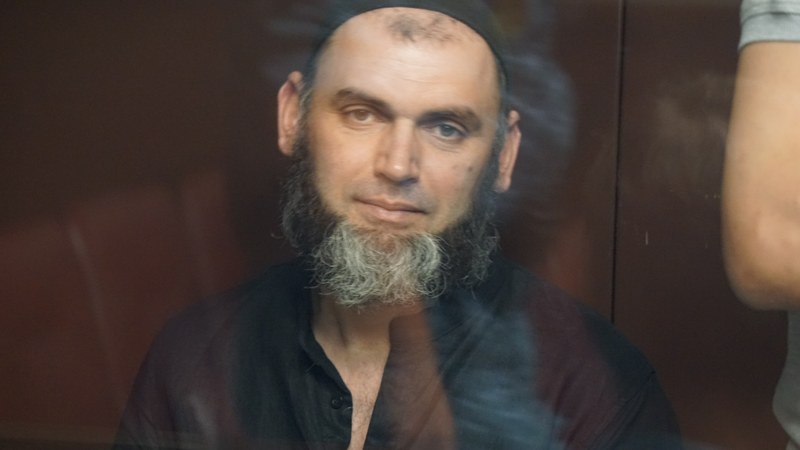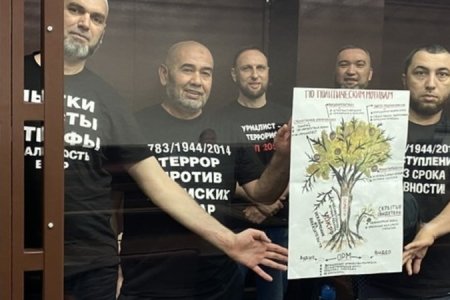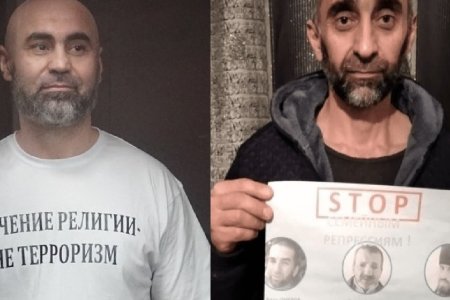
Less than a year after Russia caused the death of Crimean Tatar political prisoner Dzhemil Gafarov in the notorious Novocherkassk SIZO [remand prison], another political prisoner is also being denied medical care despite serious grounds for fearing potentially life-threatening issues.
Crimean Solidarity civic journalist Rustem Sheikhaliev suffered two violent nosebleeds on 16 January with the second unable to be contained for over twenty minutes. He had been complaining of severe headaches and chest pain for several days, and had, for some time, been asking for an electrocardiogram and proper medical examination because of his symptoms. All such requests were ignored, with the SIZO ‘medical staff’ at best injecting him with some unknown substance or giving painkillers.
Less than a week ago, Sheikhaliev told his lawyer, Lilia Hemedzhy that a prisoner had died in the SIZO recently after being denied medical care. The conditions in the Novocherkassk SIZO are notoriously bad even by the appalling standards of such Russian institutions. According to Sheikhaliev, there had been no water at all in their cell for several days with the SIZO administration refusing to fix the problem. Since there will be a number of men in a confined space, with any ‘toilet facilities’ at best fairly rudimentary, the lack of water is a serious health hazard. No attempt has been made to deal with the rat infestation, with the men forced to take turns sleeping to ensure that the rodents do not bite the men while they’re asleep.
The second, most severe, nosebleed on 16 January led to the adjournment of the ongoing appeal hearings into the internationally condemned sentences against Rustem Sheikhaliev, two other Crimean Tatar journalists Osman Arifmemetov and Ruslan Suleimanov, as well as civic activists Enver Ametov and Yashar Muyedinov.
This is the final appeal hearing in the political ‘trials’ of 25 Crimean Tatar civic journalists and activists who were arrested on 27 March 2019 or shortly afterwards. This was internationally recognized as an attack on civic journalists and activists, most of them linked with the important human rights movement Crimean Solidarity. There was criticism of Russia’s use of ‘terrorism’ charges against men taking a civic stand, and calls for the men’s release from, among others, the US State Department, Human Rights Watch, Freedom House and Civil Rights Defenders. All of the men were recognized as political prisoners by the Memorial Human Rights Centre. Among the reasons why the current Russian regime moved to crush Memorial was the human rights organization’s insistence that the men’s imprisonment was not only an attack on the Crimean Tatar human rights movement. It was, in addition, illegal since Russia, as occupying state, had no right to use its repressive legislation in occupied Crimea.
The men were not accused of having committed a recognizable crime, only of totally unproven ‘involvement’ in Hizb ut-Tahrir, a peaceful transnational Muslim party which is legal in Ukraine. The charges, under Russia’s ‘terrorism’ legislation, were based solely on a highly secretive and almost certainly politically motivated ruling from Russia’s supreme court in 2003 which declared Hizb ut-Tahrir ‘terrorist’, without providing any explanation. Five of the men, including well-known journalist Remzi Bekirov, were accused of ‘organizing a Hizb ut-Tahrir group (Article 205.5 § 1 of Russia’s criminal code, and received sentences of up to 19 years’ in the worst of Russia’s penal institutions. The other men, including Sheikhaliev, were accused of ‘taking part’ in this supposed ‘group’, with most receiving sentences of 12-14 years. All 25 men were also charged, under Article 278, with the even more preposterous “planning a violent seizure of power and change in Russia’s constitutional order”.
No evidence of actual involvement in Hizb ut-Tahrir was ever provided, with the men charged on the basis of entirely innocuous discussions (about courage, for example) illicitly taped three years earlier, and ‘anonymous witnesses’ whose ‘testimony’ could not be verified, and who might not have even known the men. It was almost certainly to deflect any further adverse attention to this evident attack on that Russia decided to divide them up into five cloned ‘trials’.
It is the appeal hearings against the last of these sentences that are now being heard. On 24 November 2022, Crimean Solidarity civic journalists Osman Arifmemetov; Rustem Sheikhaliev and Ruslan Suleimanov were sentenced to 14 years’ harsh-regime imprisonment; civic activists Enver Ametov and Yashar Muyedinov – to 13 years. Prosecutor Yevgeny Kolpikov had demanded sentences of 15-17 years, with 5 years in a prison. ‘Judges’ Viacheslav Korsakov (presiding), Denis Galkin and Igor Shendrikov from the notorious Southern District Military Court in Rostov made it 13-14 years, with 4 years in a prison.
The appeal hearings are now drawing to an end at the Vlasikha military court of appeal in Moscow region. The latter has become as notorious as the court in Rostov, and there are, unfortunately, no grounds for expecting Sergei Aleksandrovich Butusov and two other ‘judges’ to adopt the only possible just ruling and overturn the sentences.



